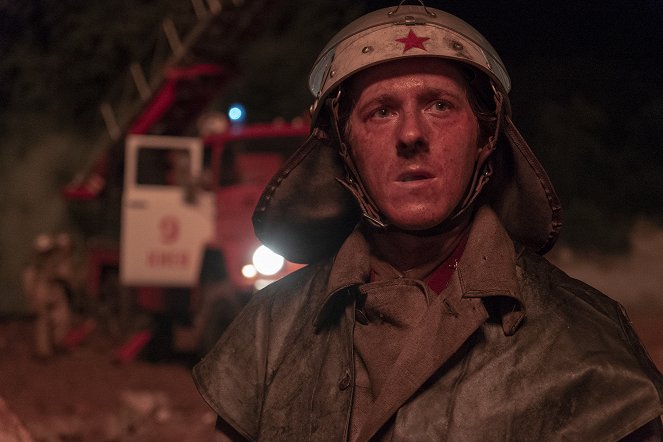Chernobyl
Creators:
Craig MazinDirected by:
Johan RenckScreenplay:
Craig MazinCinematography:
Jakob IhreComposer:
Hildur GuðnadóttirCast:
Jared Harris, Stellan Skarsgård, Paul Ritter, Jessie Buckley, Adam Nagaitis, Con O'Neill, Adrian Rawlins, Sam Troughton, Robert Emms, Michael Shaeffer, Adam Lundgren, Karl Davies, Paulius Markevičius (more)VOD (2)
Plots(1)
April 26, 1986, Ukrainian Soviet Socialist Republic. An early-morning explosion at the Chernobyl nuclear power plant sends workers scrambling to assess the damage. When reports reach the control room that the reactor's core is "gone," deputy chief engineer Anatoly Dyatlov, insisting that's impossible, sends men to the core itself to investigate. Meanwhile, Vasily, a fireman in the nearby town of Pripyat, is summoned to help put out the fire, leaving behind his wife Lyudmilla, who gathers with other residents of nearby Pripyat to marvel at the strange glow in the distance. As plant workers and firemen quickly succumb to radiation, Dyatlov and plant directors Viktor Bryukhanov and Nikolai Fomin meet with the Pripyat council and insist that radiation levels are not dangerously high; the council subsequently decides to seal off Pripyat and cut its phone lines to prevent the spread of "misinformation." As sick patients begin to stream into the local hospital, a skeptical academician, Valery Legasov, is tasked by the Central Committee of the USSR to serve as an expert on its Chernobyl task force. (Home Box Office)
(more)Reviews (5)
The first episode of the artistic reconstruction of the Chernobyl disaster is characterized by an effort to adhere to commonly known facts and it does not look cheap or lazy. Johan Renck has a sense for creating a dark, hopeless atmosphere and for choosing actors. I am looking forward to seeing Jared Harris in future episodes as well. Despite all the efforts to create a perfect illusion of the fourth block of the Chernobyl power plant at the time of the explosion, I have conflicting feelings about what I saw. Reason and the experience gathered from 23 years of practice in operating a nuclear power plant resist believing in human behavior and the reactions of the block's personnel. It's not about observing incorrect manipulations and decisions of the block supervisors, I have known those for a long time. But when one sees the staff moving through the wreckage of the building without personal dosimeters or any protective equipment, touching contaminated fittings with bare hands, breathing air full of aerosols and dust particles without respirators, it tends to shake them. A nuclear engineer, who, knowing that the reactor was blown apart by an explosion, obediently goes up to the roof to look into the open reactor core just because their superior ordered them to. It's simply something so distant from the behavior and mentality of Central Europeans that I keep asking myself how much of what I see corresponds to reality. In relation to Chernobyl, I always had different questions: for example, how is it possible that the disaster actually caused an unbelievably small number of immediate and subsequent victims? At the time of the exposure, there were 400 employees at the power plant, many of whom received extremely high doses and, contrary to expectations, lived to an old age. And this was despite the supposedly terrifying Eastern European lifestyle and stress. Furthermore, the majority of those who died from radiation-related illnesses were firefighters from outside the power plant. I attributed this to the fact that they actually behaved rationally during the accident and tried to limit their exposure. However, the first episode does something different, perhaps for dramatic effect. We will see how the creators handle the subsequent episodes.
()
Here, reality plays to the (dis)advantage of the film medium. A paradox that will be built upon or undermined in future episodes. Factual accuracy as a means of detached narrative, which no one would believe in the field of fiction even if they wanted to. I want more of a relationship with the characters; otherwise, from the position of a neutral "documentary" with a generous budget behind it, it's a fundamentally missed opportunity.
()
An impressive opening thrust into the story. Rarely has there been a representation in which the story line and main event is more prominent than the key characters and their stories, but that is the case here. The first episode styles the Chernobyl power plant as an imaginary monster that is about ten times more terrifying than five Marvel villains combined. So far, a hyper-realistic, raw historical document that sticks accurately to historical realities and makes the medium of film exactly at the over-the-top moments where it's needed most.
()
A bit telegraphic, but a very raw and tense view of one of the biggest catastrophes in modern times and its immediate consequences. I voluntarily succumbed to the stifling atmosphere and the sharp political insight and I’m really looking forward to (and also await nervously) what’s coming next. After this episode, I’m there with them.
()
I'm not sure if I've ever seen such a strong opening episode of a series. I don't think so. Setting aside how it really happened and how the filmmakers possibly helped themselves, because the atmosphere of the first episode absolutely captivated me. The feeling of fear, futility, and depression was almost tangible, this was truly a powerful experience.
()

Ads